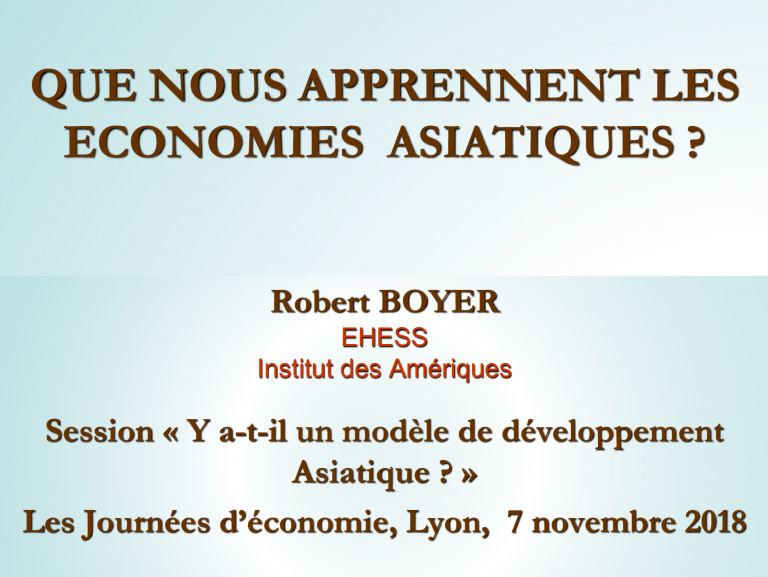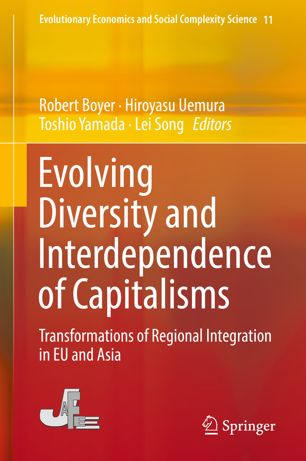Présentation préparée pour Les Journées d’économie, session « Y a-t-il un modèle de développement Asiatique ? », Lyon, 7 novembre 2018
Boyer Robert, Toshio Yamada, and Lei Song (Eds), Book, Part of the Evolutionary Economics and Social Complexity Science book series (EESCS, volume 11), Springer, Japan KK, part of Springer Nature 2018
Introduction
This book integrates three levels of political–economic analysis: first a comparative institutional analysis of the varieties of capitalism in both Europe and Asia, second a macroeconomic analysis of industrial structural change and economic dynamics of the national economies in Europe and Asia, and then an encompassing analysis of international production linkages and international financial instability which determine the long-term patterns of regional integration in Europe and Asia. The comparison of the European Union and ASEAN delivers some key conditions for a viable long-term regional economic integration to cope with contrasted capitalisms and growth regimes: either pragmatism in the choice of an exchange rate regime, or a form of fiscal federalism. The reader will also find a genuine analysis of the dynamism of the Chinese economy, a study on institutional changes and de-industrialization in Japan, and the increasing international production linkages among China, Japan, Korea, and ASEAN. It is shown how the enlargement of the European Union and the Euro triggered the diverging competitiveness and macroeconomic performances that led to the crisis of a six decades long economic and political process. This book is the result of long lasting Asian–European collaborative research. It is a milestone in the historical and comparative analysis along the régulation theory that aims at understanding the long-run transformations, renewed diversity and interdependence of capitalisms.
Revue de la régulation, n° 21, 1er semestre, Spring 2017, Sous la direction de Robert Boyer et Sébastien Lechevalier
Maison des Sciences de l’homme
Notes de la rédaction
La Revue de la régulation fête ses dix ans ! Et encore, si l’on comptait L’Année de la régulation, son aînée, elle aussi portée par l’Association Recherche & Régulation, on fêterait aujourd’hui vingt ans de publications.
Le dossier sur l’économie politique de la Chine que nous présentons dans ce numéro est tout à fait représentatif de ces dix premières années. Il témoigne de la réussite de notre pari : faire vivre une Revue d’économie politique, nourrie des approches régulationnistes et institutionnalistes mais aussi de tous les courants qui engagent le dialogue avec elles. Il pointe aussi quelques-uns des défis auxquels il nous faut faire face.
Pour préparer ce dossier consacré à l’espèce particulière de capitalisme qui se développe aujourd’hui en Chine, Robert Boyer, co-fondateur de la Théorie de la Régulation et de la Revue du même nom, s’est associé à Sébastien Lechevalier (EHESS) (voir l’introduction au dossier). Dix ans après son lancement, un tel dossier permet de jeter un regard rétrospectif et actuel sur ce que représente notre Revue – et notre communauté de chercheurs. Sans nul doute, la construction de dossiers, souvent portés par des membres du comité de rédaction en collaboration avec un ou plusieurs chercheurs extérieurs à la Revue, est l’une des clés de la dynamique scientifique qui l’anime. Lire la suite…
Paper prepared for the « Forum de la régulation« ,
La théorie de la régulation à l’épreuve des crises, Paris 10-12 juin 2015
Table ronde « Nuevas dinamicas de las relaciones Asia/Americas« , Casa de Francia, Lunes 18 de Enero 2016, Mexico (Mexique)
A world of contrasted but interdependent inequality regimes: China, United-States and European Union
Review of Political economy, Vol. 27, n° 4, October 2015, p. 481-517.
Abstract:
A number of contemporary paradoxes warrant explanation. First, in China, economic development has reduced poverty but dramatically increased inequalities. Second, the finance-led growth regime of North America has brought about a rupture with the Fordist Golden Age, causing a surge of inequality because of quite specific spill-over effects from the economy to policy. Third, the Eurozone crisis is often perceived as reflecting the limits of welfare states and the ideal of social equality, but some countries continue to exhibit an extended welfare system, moderate inequalities and a dynamic innovation and production system. To explain these paradoxes, this article applies a socio-economic approach based upon the concept of inequality regimes. Conventional interpretations stress the universality of the mechanisms that widen individual inequalities within each nation-state but reduce the hierarchy of national standards of living. This analysis, however, concludes that China, North America and Europe do not follow the same trajectory at all, since they have developed contrasting regimes of inequality that co-evolve and are largely complementary at the global level. This suggests an alternative to the hypothesis of an irreversible globalization of inequality.
Analyseinstitutioninegalites1à Tunis (Ecole Supérieure de Commerce) à l’invitation de l’Ambassade de France à Tunis, 16 décembre 2014.
ProtectionPaysEmergentsUGTTTunis122014Boyer3Présentation d’un séminaire à l’UGTT, Tunis, à l’invitation de l’Ambassade de France à Tunis, 16 décembre 2014.


